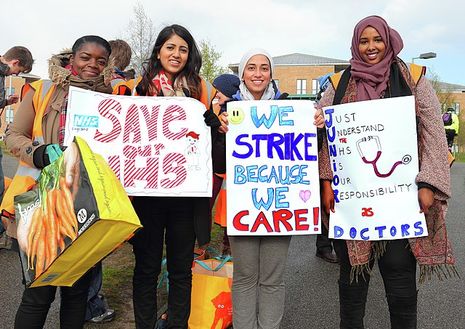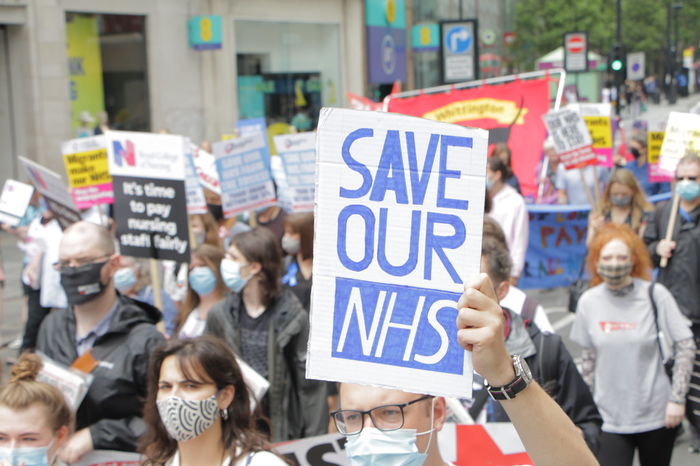Cambridge hospitals face ‘enormous’ strike disruption
Junior doctors are co-ordinating striking with consultants for the first time

Cambridge hospitals are facing “enormous” disruption as junior doctors and consultants strike together for the first time.
Consultants who began their 48-hour strike on Tuesday (19/09) were joined on Wednesday by junior doctors. Junior doctors will continue their strike through to Thursday (21/09) and Friday (22/09), with a further joint strike also planned for October 2nd, 3rd and 4th.
During both periods of industrial action, staff will work on a “Christmas Day cover”, meaning emergency care will still be provided.
Cambridge University Hospitals (CUH) is made up of Addenbrooke’s and The Rosie, a women’s hospital.
Dr Fiona Head, Chief Medical Officer at NHS Cambridgeshire & Peterborough, emphasised that those who “need urgent medical care” should continue to “come forward as normal, particularly in an emergency or life-threatening situations”.
Dr Ashley Shaw, Medical Director at Cambridge University Hospitals, said that the hospital loses 1,000 outpatient appointments for every strike day.
Up to the end of July, there had been around 570 planned operations lost due to strike action, highlighting the “very large impact on a lot of patients”, Shaw continued.
Dr Shaw added: “Strikes also have an impact on staff morale, not just doctors, but probably more so in more medical staff having to do extra stuff to cover and to cancel and rebook appointments”.
“It also stifles progressive work to make the hospital a better place for patients. We are stuck in a cycle of planning for strikes, executing strikes, debriefing, and then planning for the next one”, Shaw continued.
Roland Sinker, Chief Executive of Cambridge University Hospitals, told the Cambridge Independent that while the trust had a “strong team”, relationships between professional groups were “starting to fray” and that this would “take a long time to repair”.
Earlier this month, figures were released showing that the NHS waiting list in England had reached a new record high with 7.7 million people – around one in seven – waiting for treatment.
According to the British Medical Association (BMA), strikes have cost the Government an estimated £1bn, a fee they claim is similar to what “restoring the pay of junior doctors and settling the dispute” would have cost.
Co-chairs of the BMA’s Junior Doctors committee, Dr Rob Laurenson and Dr Vivek Trivedi, said: “Junior doctors in England do not want to strike but we will, and we will do so for as long as it takes for this Government to get back round the table and give us a credible offer to bring an end to the strikes”.
“The Prime Minister’s latest offer is still a real terms pay cut, amounting to a doctor being paid just over £15ph when starting work and still sees junior doctors around 26% worse off than in 2008”.

‘We’ve gone from clapping to slapping doctors and nurses’: Cambridge’s final-year medics on NHS junior doctors’ strikes | Varsity
“The only workforce to have lost more of their pay in this time, are our consultant colleagues”, the co-chairs continued.
A Department of Health and Social Care spokesperson said: “We accepted the independent pay review body’s recommendations in full, meaning doctors who started their hospital training this year are receiving a 10.3 percent pay increase, with the average junior doctor getting 8.8 percent”.
“This pay award is final and the Health and Social Care Secretary is clear his door is open to discuss non-pay issues if the BMA call an end to this damaging disruption”, the spokesperson continued, whilst also stating that consultants are “in the top 2 percent of earners in the country”.
Cambridge University Hospitals was approached for comment.
 News / CUP announces funding scheme for under-represented academics19 December 2025
News / CUP announces funding scheme for under-represented academics19 December 2025 News / SU reluctantly registers controversial women’s soc18 December 2025
News / SU reluctantly registers controversial women’s soc18 December 2025 News / Cambridge welcomes UK rejoining the Erasmus scheme20 December 2025
News / Cambridge welcomes UK rejoining the Erasmus scheme20 December 2025 Features / Should I stay or should I go? Cambridge students and alumni reflect on how their memories stay with them15 December 2025
Features / Should I stay or should I go? Cambridge students and alumni reflect on how their memories stay with them15 December 2025 Film & TV / Timothée Chalamet and the era-fication of film marketing21 December 2025
Film & TV / Timothée Chalamet and the era-fication of film marketing21 December 2025









